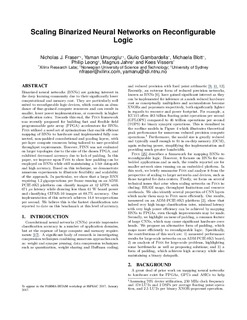Scaling Binarized Neural Networks on Reconfigurable Logic
Fraser, Nicholas J.; Umuroglu, Yaman; Gambardella, Giulio; Blott, Michaela; Leong, Philip W.; Vissers, Kees; Jahre, Magnus
Original version
10.1145/3029580.3029586Abstract
Binarized neural networks (BNNs) are gaining interest in the deep learning community due to their significantly lower computational and memory cost. They are particularly well suited to reconfigurable logic devices, which contain an abundance of fine-grained compute resources and can result in smaller, lower power implementations, or conversely in higher classification rates. Towards this end, the FINN framework was recently proposed for building fast and flexible field programmable gate array (FPGA) accelerators for BNNs. FINN utilized a novel set of optimizations that enable efficient mapping of BNNs to hardware and implemented fully connected, non-padded convolutional and pooling layers, with per-layer compute resources being tailored to user-provided throughput requirements. However, FINN was not evaluated on larger topologies due to the size of the chosen FPGA, and exhibited decreased accuracy due to lack of padding. In this paper, we improve upon FINN to show how padding can be employed on BNNs while still maintaining a 1-bit datapath and high accuracy. Based on this technique, we demonstrate numerous experiments to illustrate flexibility and scalability of the approach. In particular, we show that a large BNN requiring 1.2 billion operations per frame running on an ADM-PCIE-8K5 platform can classify images at 12 kFPS with 671 μs latency while drawing less than 41 W board power and classifying CIFAR-10 images at 88.7% accuracy. Our implementation of this network achieves 14.8 trillion operations per second. We believe this is the fastest classification rate reported to date on this benchmark at this level of accuracy.
